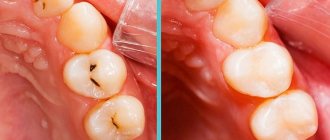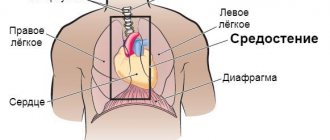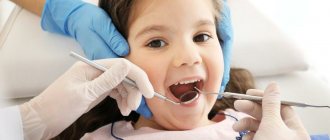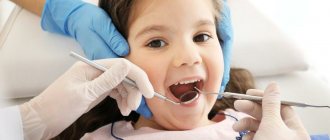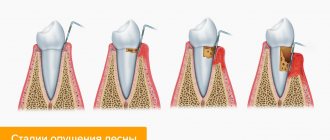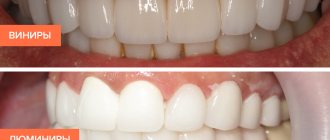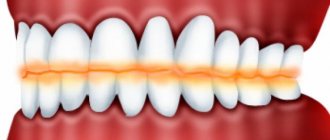Teeth can hurt for various reasons. Often toothache occurs from cold. The following factors influence dental hypothermia:
- The tooth is affected by caries or an inflammatory process has begun in the deep layers of dental tissue and affected the nerve. If the immune system is weakened, the nerve may become inflamed from the cold.
- Cold causes active activity of pathogenic bacteria.
- Due to hypothermia, pathogenic bacteria begin to multiply intensively in the nasal cavities. The inflammatory process can spread from the nose to the teeth. Cold is a favorable environment for the life of pathogenic microorganisms.
- If inflammation of the trigeminal nerve occurs from hypothermia, it is difficult to distinguish it from dental diseases.
- Herpes, which occurs on the lips from hypothermia, can cause inflammation of the nerve endings of the teeth.
Why can teeth react to cold?
There are many reasons why discomfort and pain may occur when drinking cold or hot drinks or food. Most of them are directly related to diseases of the oral cavity, but there are also those that are not directly related to dental pathologies:
- Damage to tooth enamel.
Violation of the integrity of the outer covering of the tooth can be caused by a variety of reasons: frequent consumption of hard and dry food, which scratches the enamel during chewing; - mechanical chips;
- an incorrectly selected toothbrush (doctors recommend using medium-hard brushes for adults and soft-bristled brushes for children);
- eating foods that can negatively affect the condition of enamel (carbonated sweet drinks, sour fruits, food additives, etc.).
is one of the most common causes. The fact is that most people don't even think about the fact that they have tooth decay until a distinct black spot appears on the tooth. In fact, caries in the early stages can only be distinguished by an experienced dentist - a tiny gray dot (and this is what “young” caries looks like), if it is not examined in time and urgent measures are not taken to eliminate it, it first becomes the cause of increased sensitivity, and then acute pain.
. Untreated caries invariably leads to another, even more serious disease - pulpitis - destruction of the soft tissues of the tooth. Naturally, with pulpitis, the dental nerves are exposed, which causes acute pain when eating cold, hot, sweet or sour food.
. If the gums become inflamed, in most cases the subgingival part of the tooth, the dentin, is exposed. Dentin is completely devoid of a protective layer - enamel - therefore, at the slightest contact with cold water, food, or even just cold street air, patients invariably experience discomfort and pain.
If you suspect one of the above reasons, you should not delay visiting the dentist for long - an experienced specialist will quickly identify the problem and prescribe a course of treatment.
Reasons not related to oral diseases include the following:
- any hormonal disorders
and changes in the body. As a rule, such conditions occur while taking hormonal drugs, oral contraceptives, during pregnancy or breastfeeding; - suffered nervous shocks
, life in a state of constant stress, etc.; - deficiency of vitamins
, minerals and nutrients in the body. “Seasonal” sensitivity can often occur - when in spring and autumn, due to vitamin deficiency, many patients begin to complain of a certain discomfort after taking cold or hot; - damage to the immune system
, viral diseases; - endocrine diseases
(disorder of one or more endocrine glands).
If increased tooth sensitivity is caused by these particular pathological conditions, then no special dental treatment is required - the main treatment should be aimed at eliminating the root cause.
If, after a serving of ice cream or a glass of cold juice, you suddenly feel discomfort, which smoothly turns into acute pain, it is quite acceptable to take a tablet of a pain reliever that is suitable for you - this can be Nimessil (powder for dissolving in warm water), Aertal (tablets), Ketonov , Dexalgin.
Complications and consequences
If your teeth hurt from cold and wind, then timely treatment is required. In its absence, pulpitis appears - inflammation of the pulp (internal tissue of the tooth). As the infection develops, flux appears. It is also possible to develop periodontitis - inflammation of the soft tissues that are adjacent to the upper part of the tooth root.
An infection also develops in the tooth, and this causes complications on the internal organs: pathogenic microorganisms are spread throughout the body with the blood. As a result, a vulnerable organ suffers: it could be the bladder, ovaries, lungs or heart. Therefore, even if the pain has disappeared, treatment is still needed.
Another complication of an untreated tooth is phlegmon. This term refers to purulent inflammation of deep tissues, which leads to tissue necrosis. Due to untreated hypothermia of the trigeminal nerve, paresis or paralysis develops. Advanced neuritis causes a chronic condition in which nothing helps.
Reaction to cold after dental procedures
Often the cause of a sudden reaction of teeth to cold or hot is recent dental procedures:
- Whitening. In order to understand how this very popular procedure today affects tooth sensitivity, let us recall that whitening (especially done at home or in a suspicious clinic by an inexperienced doctor) can cause severe thinning of tooth enamel. Needless to say, abuse of the procedure invariably leads to damage to the enamel and, accordingly, causes hyperesthesia.
By the way, frequent use of highly abrasive whitening toothpastes can lead to teeth reacting to cold or hot temperatures. If you prefer to use whitening pastes, choose gentle and gentle preparations.If increased sensitivity is the result of excessive whitening, you should first stop using abrasive pastes and contact your dentist to undergo a fluoridation or remineralization procedure.
- Sealing . Most often, after conventional therapeutic treatment of deep caries or pulpitis, patients experience increased tooth sensitivity. The reason for this is the effect on the pulp and nerve endings, after which it is not recommended to drink cold or hot for a few more days. As a rule, there is no acute pain, so the patient can easily cope with the discomfort. If it suddenly turns out that after 2-3 days the sensitivity does not disappear, the discomfort gradually turns into pain, you need to urgently consult a doctor - perhaps an inflammatory process has begun, which needs to be eliminated as soon as possible.
- Prosthetics . During the installation of fixed or removable dentures, tooth enamel can also be damaged.
It is rarely possible to avoid hypersensitivity after dental procedures, so it is recommended to minimize the consumption of cold or hot drinks, ice cream, hot food, etc.
Causes of acute reactions to temperature stimuli
Increased sensitivity of enamel in medicine is referred to as “hyperesthesia”. The condition is manifested by acute toothaches with a sharp change in temperature. In this case, discomfort is usually observed in any one area of the jaw. There are several causes of the pathological condition, each of which should be considered separately.
Caries or pulpitis
A carious lesion is a black or brown dot on the enamel. Damaged teeth become susceptible to any external influences, including temperature. Painful sensations also occur in the initial stages of pathology, when caries is at the chalk spot stage. The symptom signals the beginning of enamel destruction, which without timely intervention will be complicated by damage to dentin and pulp.
Poor quality dental treatment
After visiting a doctor, there is a risk of increased enamel reaction to cold food. The problem is associated with poor cleaning of the dentinal tubules and incomplete removal of nerve endings. Another doctor’s mistake that leads to pathology is loose filling material. The temperature provocateur enters the deep layers of the tooth, thereby causing negative reactions. The situation requires a second visit to the doctor. Otherwise, the filling will be destroyed and discomfort when eating food will increase.
Whitening
To improve the appearance of their teeth, many patients resort to whitening procedures. It gradually leads to a thinning of the enamel surface and a decrease in its density. The problem is not a reason to panic; it is enough to follow some rules for several days after whitening: remove sour and sweet foods and ice water from your diet; include fish, cottage cheese and other dairy products that contain calcium and phosphorus in the menu. These elements play a vital role in the formation of tooth enamel.
The teeth whitening procedure may cause the element to react to cold
Why does a tooth react to cold? Other external factors that lead to the development of the problem should be noted:
- Consumption of products with aggressive chemical composition – carbonated drinks; foods with citric acid. The substances gradually dissolve the bone tissue of the tooth and thin the enamel.
- Mechanical damage to elements. Injury occurs from accidental blows or from consumption of hard foods (chips, crackers, nuts).
- Malocclusions that cause uneven load on the units. Improper closure of teeth causes enamel wear.
- Exposing the neck of the element. The tooth hurts from cold due to increased dentinal sensitivity. In the problem area, there is detachment of the gums or its receding.
- The period after treatment. In normal conditions, increased sensitivity of the enamel lasts no more than 1 week.
- Bruxism, or involuntary teeth grinding.
Why does a dead tooth react to cold?
Increased tooth sensitivity is the result of irritation of nerve endings. Accordingly, after removal of the nerve, the tooth should not react in any way to cold or hot. However, in practice the opposite occurs - a “dead” tooth aches, hurts and causes the patient a lot of discomfort. There may be several reasons for this:
- In fact, one of the neighboring, “living” teeth reacts to the cold, although it may seem that it is the pulpless one that hurts. In this case, you need to contact a specialist to figure out why this healthy tooth reacts to cold (damaged enamel, caries, pulpitis, etc.).
- The “dead” tooth was poorly healed. There are times when even an extremely experienced doctor, who has the most modern equipment at his disposal, cannot completely cope with pulpitis in one go due to the banal non-standard structure of the tooth canals. As a result, the nerve is not completely removed, and when you eat cold or hot food, the tooth begins to hurt. To eliminate the sensitivity of such a tooth, it is necessary to take an x-ray and consult a dentist for complete removal of the nerve.
- It also happens that the dental nerve is completely removed, but the canals are poorly sealed - in this case, an inflammatory process begins under the filling, which causes a reaction to cold.
You should also not miss the fact that the cause of a pulpless tooth’s reaction to cold or hot may be an infectious viral disease or hormonal imbalance.
Causes
Teeth hurt from cold, usually due to:
- general hypothermia of the body;
- being in front of an air conditioner;
- staying in a draft;
- ice cold drink;
- breathing through the mouth in the cold;
- walking in windy weather with an unprotected face.
How long can you walk in the cold and wind to prevent a cold? Everything is individual. For some, half an hour is enough for a cold to appear. And others can walk all day and not have a single symptom of the disease.
Can teeth hurt from cold food? If it is very cold, then this symptom occurs. This also occurs when drinking liquid at low temperatures.
Treatment at home
Unfortunately, getting an appointment with a good dentist can be very difficult. But what to do if you need help in the fight against increased sensitivity of teeth right now? To solve this problem, you can turn to effective folk and home remedies:
- For many years, decoctions (infusions) of herbs have been considered one of the most effective remedies. They relieve inflammation, many of them have antibacterial, soothing and healing properties. You can prepare a decoction of chamomile, oak bark, sage, oregano, calendula, and burdock. You can make an herbal cocktail - mix several dry herbs, pour boiling water and cook in a water bath for 15 minutes, cool and rinse your mouth several times a day.
- Propolis is very famous for its antibacterial properties. You can use it to prepare an alcohol tincture for mouth rinsing by pouring alcohol into a piece of propolis.
- If you are a big fan of warm milk, then the following method is created especially for you - all you need is to simply drink warm milk more often, but do not immediately swallow it, but leave it in your mouth for a while. Why does this method work? Milk contains calcium, which has a beneficial effect on tooth enamel, strengthening it, thereby reducing tooth sensitivity.
However, the surest way to get rid of increased tooth sensitivity is to use special pastes, gels and mouth rinses with fluoride. If you do get an appointment with a dentist, he will most likely suggest that you undergo a fluoridation or teeth remineralization procedure.
You should not rely entirely on folk and home remedies. They may serve as an adjunct to primary therapy rather than as the sole treatment.
Choosing toothpaste
Needless to say, you need to pay special attention to the choice of toothpaste? The first thing you need to learn is that if increased tooth sensitivity occurs, you need to give up whitening pastes (at least for a while, until this problem is finally resolved). Subsequently, such means can be used, but very carefully.
So, what to look for when choosing toothpaste for sensitive teeth:
- Choose only special toothpastes (usually manufacturers indicate this on the packaging);
- Pay attention to special medications that reduce tooth sensitivity (they are sold exclusively in pharmacies);
- It is recommended to give preference to pastes or gels with a high fluoride content - such preparations, if used regularly, restore tooth enamel, thereby coping with the problem of hypersensitivity.
Don’t forget about choosing the right toothbrush - it should be of medium hardness in order to remove food debris from the surface of the teeth without scratching the enamel.
Treatment
If a doctor has diagnosed a patient with hypersensitivity, treatment is usually prescribed depending on the cause of the disease, as well as the degree of its development. In modern dentistry, there are many techniques, so treating sensitive teeth is usually not difficult for a dentist.
- With grade 1 hyperesthesia, complex surgical or therapeutic treatment is usually not required. Sometimes it is enough to carry out a course of dental fluoridation, which consists of applying applications of calcium and fluorine salts to the diseased tooth.
- When treating stage 2 and 3 disease, application of applications is sometimes not enough; it may be necessary to cover the enamel using modern filling materials.
If the cause of hyperesthesia is a carious process, it is necessary to prepare the tooth, clean the cavity from tissues affected by caries and put a filling.
If the cause of the disease is receding gums as a result of inflammation of periodontal tissue and exposure of the cervical areas, it is necessary to carry out surgical treatment, during which the gums are lifted and cover the neck of the tooth.
When treating a generalized form of hyperesthesia, it is necessary to simultaneously prescribe drugs to normalize phosphorus-calcium metabolism in the patient's body. For this, the dentist usually prescribes calcium glycerophosphate preparations, as well as multivitamin complexes, which should be taken throughout the course of treatment for hyperesthesia.
If increased sensitivity persists after filling, it is necessary to check the quality of the filling. If the filling is placed incorrectly, its edges do not adhere tightly to the tooth enamel, and food debris can get into the resulting gap, causing pain. In this case, it is necessary to refill the tooth. Sometimes sensitivity after caries treatment may indicate the presence of a chronic inflammatory process inside the tooth pulp.
If you experience tooth sensitivity after cleaning or whitening, this may indicate thinning tooth enamel.
If there are no other carious and non-carious diseases, a good effect in the treatment of hyperesthesia can be achieved using electrophoresis procedures with a solution of calcium glycerophosphate. Another new and effective remedy is to coat the enamel surface with a special varnish containing calcium and sodium fluorides. Thanks to these measures, it is possible to get rid of sensitivity for a long time.
Whitening sensitive teeth should be done with extreme caution, only in a specialized clinic after consultation with an experienced specialist. After all, during the whitening process, tooth enamel can also become thinner and more sensitive. The doctor must select the most gentle whitening technology, as a result of which the enamel will not be damaged.
Dental sensitivity and braces are also interconnected; sometimes patients experience increased sensitivity after removing braces; to eliminate this sensitivity, a course of applications of calcium and fluoride salts, as well as coating the surface of the tooth enamel with varnish with calcium and sodium fluorides is usually sufficient.
If sensitivity occurs after brushing, it is necessary to use special toothpastes with a high content of fluoride and calcium. Today you can choose a good pasta, but you should entrust this matter to professionals. No one can select a toothpaste specifically for your teeth better than a dentist.
Treatment in dentistry
Few people manage to cope with the problem of increased tooth sensitivity at home. Basically, to solve this problem, sooner or later they turn to professionals, who, in turn, offer radical methods of combating hyperesthesia:
- Fluoridation
(simple or deep). A special fluoride-containing composition is applied to the teeth, which helps strengthen the enamel. Simple fluoridation requires several procedures, while deep fluoridation is performed in one visit to the doctor, and is more effective. - Remineralization
is the treatment of teeth with special compounds that can compensate for the deficiency of minerals in the enamel. - Coating with special dental varnishes
. These preparations seal the surface of the tooth, covering it with a dense film, thereby ensuring the strength of the enamel and preventing its further destruction.
If you suddenly feel that your teeth are reacting to cold or hot, immediately contact an experienced specialist who will carry out all the necessary manipulations to solve your problem:
- Initial examination. Detection of dental diseases (caries, pulpitis, gum disease, etc.).
- Drawing up a clear treatment plan.
- Sanitation of the oral cavity, elimination of all existing foci of infection.
- Removal of plaque and tartar (professional cleaning).
- Treatment of enamel with a selected composition (fluoridation, remineralization, varnishing).
After the procedure, the doctor will recommend using only special pastes, reviewing your diet by adding more foods rich in calcium and fluoride, and, of course, visiting the dentist at least once every 6 months.
Symptoms and causes
The scientific name of this pathology is paresthesia. The main symptoms by which one can suspect the onset of the disease are: a burning sensation, the appearance of goosebumps and slight tingling in the soft tissues, numbness of part of the dentition or the entire jaw at once. This condition can be caused by many reasons. It is important to understand that numbness is not always a sign of a developing disease, but it is still worth seeing a doctor.
The main factors that provoke the loss of usual sensitivity: inflammatory processes in the root system, for example, periodontitis, severe injuries to the jaw, problems with the temporomandibular joint and malocclusion, disruption of the work algorithm during installation of implants, poor-quality dental treatment, stress and tension, violation integrity of nerves, etc.
Less common causes today are allergic reactions (to medications used by the dentist or to a sudden change in air temperature) and a significant outflow of blood from the head.
How does pain occur?
People with increased tooth sensitivity know for sure that if the problem is not addressed in time, then over time it will cause a lot of trouble.
The main cause of hyperesthesia is thinning or damage to the enamel. Accordingly, the thinner this protective layer, the more often and stronger the teeth react to cold or hot. Gradually, mild discomfort turns into severe pain - after all, after the tooth enamel is destroyed, the soft tissues of the tooth, which contain the nerve endings, undergo decomposition. Irritation of the nerves invariably leads to sore teeth, it becomes painful for the patient to chew, drink, and even pain may occur when air gets into the mouth.
Stages of the problem
Over time, tooth sensitivity increases due to thinning of the enamel. It is this layer that protects teeth from external irritants: sour, sweet, bitter foods. As long as the enamel is thick, there is no discomfort during eating. When this layer thins, an acute reaction of the elements to possible types of food is noted, especially sweet, sour, cold and hot. Temperature irritants quickly penetrate dentin and affect nerve endings, causing acute pain.
Pathology goes through several stages in its development:
- The tooth feels cold and hot.
- Enamel reacts to salty, sour and sweet foods. Gradually the list of irritants expands.
- Elements react to any external stimuli, not just temperature ones. Inhaling air can cause severe pain. In advanced cases, unpleasant symptoms constantly plague a person, regardless of whether he eats or not. The situation leads to a decrease in the quality of life.
Under the top layer there is dentin, behind which sensitive nerve endings are hidden.
Forms and degrees of hyperesthesia
There are 3 stages of development of the problem:
- While eating cold food, the patient feels slight discomfort, which quickly passes and is forgotten. But it is important to understand that this is only the first call, which you definitely need to listen to. After all, it is obvious that there is already a violation of the integrity of the enamel, and the sooner measures are taken to restore it, the faster the problem of tooth sensitivity will be solved.
- Mild discomfort turns into pain. While this pain is quite tolerable, it does not occur immediately, gradually intensifies, but passes within a short time (provided that the irritant is eliminated - cold drink or food). Often such teeth react not only to cold, but also to hot, sweet, sour, spicy, salty, etc.
- The third stage - upon contact with cold or hot, spicy or sweet foods, the tooth immediately begins to hurt, the pain intensifies and does not stop even after the irritant is eliminated.
In addition, there are also several forms of hyperesthesia:
- Limited.
An individual tooth reacts to cold. - Generalized.
The entire dentition suffers from increased tooth sensitivity.
Despite the fact that hyperesthesia is a fairly common phenomenon and many patients treat this condition as normal, in fact, increased tooth sensitivity can cause the development of many other dental diseases. Therefore, you should not delay contacting the dentist.
Do not ignore preventive visits to the dentist.
It is enough to visit a specialist 1 – 2 times a year, which will allow you to promptly identify any dental problem at an early stage of development. This means that its elimination will be quick, easy and without complications.
By clicking the “request a call” button you agree to the personal data processing policy.
ethnoscience
If your teeth start to hurt in the cold, use aspen bark. It has antipyretic, antitumor, wound-healing, bactericidal, astringent, analgesic and anti-inflammatory effects. Rinsing with a decoction helps (add 1 liter of boiling water to 1 tablespoon of raw material). It is necessary to purchase aspen bark at a pharmacy, and not extract it yourself, because then it will be processed.
Calamus root, sold in pharmacies, helps. It has an analgesic effect. Traditional healers recommend making a tincture of alcohol with calamus, and then mixing with propolis and rinsing the sore spot. But it must be prepared 12 days in advance. It is also allowed to take a stick of calamus and chew it with a sore tooth. The result comes after 5-10 minutes.
What complications may arise?
If the disease is not treated, it will certainly cause very extensive complications. Hyperesthesia is no exception. If we take into account the fact that the reaction of teeth to cold and hot can be the result of a variety of pathologies, then this problem needs to be solved as quickly as possible, without waiting for these complications to make themselves felt.
Untreated hyperesthesia at an early stage eventually leads to severe toothaches - patients complain of the inability to eat, and feel pain when air enters the mouth. At stage 3, it is much more difficult to cope with the problem - after all, by this time the enamel is already quite badly destroyed, which is why numerous carious cavities are formed, etc., and drastic measures may be required.
Enamel is the protective layer of the tooth. When it is abraded, deformed or mechanically damaged, soft tissue becomes vulnerable to a huge number of bacteria. Therefore, you should not put off going to the dentist at the first signs of a reaction to cold or hot foods.
Diagnostics
If a patient complains of tooth sensitivity to cold, hot, sweet and sour foods, the doctor may immediately suspect hyperesthesia. The disease can be diagnosed after a visual examination of the patient's oral cavity. During the examination, the doctor may note changes in the structure of the hard tissues of the tooth, as well as changes in the condition of the periodontium. Usually there is a decrease in hard tissue at the cutting edge (front teeth) or on the chewing surface (back teeth).
Differential diagnosis of hyperesthesia lies in the ability to distinguish the symptoms of tooth sensitivity from the symptoms of acute pulpitis. In acute pulpitis, pain is prolonged, pain occurs mainly at night. With hyperesthesia, the pain is short-term, occurs directly from chemical or thermal irritation of the tooth and goes away almost immediately.
Prevention of tooth sensitivity
A few decades ago, it was possible to escape from increased sensitivity of teeth only with folk remedies, but today there are a lot of special drugs that help in the prevention and treatment of this pathological condition - these are toothpastes, brushes and rinses, which, when used regularly, help cope with increased sensitivity. Based on the fact that the composition of all drugs is different, experts recommend changing the medicinal paste or rinse from time to time. But it is better to avoid using whitening pastes.
In addition, there are a number of standard recommendations, the implementation of which will protect the enamel from damage:
- Regular, thorough oral hygiene (2 times a day - morning and evening, during the day it is recommended to rinse your mouth after each meal). It is advisable to use a brush of medium hardness.
- The diet should be well balanced - vitamins, minerals, nutrients. Be sure to include dairy products, fish, and meat in your menu. But it is better to limit sweets and spicy foods as much as possible. Also, to preserve the integrity of the enamel, try to avoid dry solid foods - crackers, seeds, etc., as well as carbonated drinks.
- Consult your doctor and choose the appropriate course of vitamins and minerals for yourself.
- Don't forget to visit your dentist regularly - for a routine examination you need to make an appointment at least once every six months.
If, despite all preventive measures, your teeth react to cold or hot, be sure to consult a doctor - perhaps the problem lies deeper and only an experienced specialist can identify its cause.
Author: Elena Grunina Dentist-therapist, endodontist. Work experience more than 9 years. The information is for reference only. Before treatment, consultation with a doctor is necessary.
Pills
If the pain is severe and traditional methods are ineffective, then pharmaceuticals are used. These are painkillers. When the pain is of average intensity, Ibuprom, Solpadeine, Tamipul are used. It is undesirable to use older generation painkillers, such as analgin, since these medications are harmful to the stomach.
Anti-inflammatory drugs include Aspirin, Ibuprofen, Nise, and Paracetamol. But if these medications do not help, then powerful drugs are used, for example, Ketanov. But the drug is so strong that it has many side effects and contraindications. Therefore, if possible, it should be abandoned. You can also perform local anesthesia by applying cotton wool with Lidocaine or special dental gels - Kamistad or Dentol.
What can cause hyperesthesia?
Caries
Focal demineralization of enamel and destruction of tooth tissue leads to the formation of a cavity in dentin. This, in turn, opens access to external irritants directly into the hypersensitive pulp. If treatment is not started in time, the process naturally leads to periodontitis, pulpitis and ends in tooth loss.
Thinning enamel
Intensive loss of enamel due to its rapid abrasion leads to exposure of dentin and a painful reaction of the tooth to any external influences. There are many reasons for enamel depletion: malocclusion, bruxism, fluorosis, incorrectly selected dentures, tooth loss, leading to increased stress on the remaining dentition. Among the pathologies that thin the enamel, there may also be pathologies not directly related to the condition of the teeth. These are, for example, hormonal disorders.
Cracks in enamel
Even microcracks and microchips in tooth enamel can lead to the development of a painful reaction to cold and hot. The cracks make it easier for external irritants to access the pulp.
Wedge-shaped defect
Like the previous reason, a wedge-shaped defect refers to non-carious pathologies of hard tooth tissue. It is characterized by the formation of a wedge-shaped lesion in the area of the tooth neck. Most often, pathology occurs on the front teeth. Its causes are periodontitis, damage to the enamel by external factors (for example, the wrong toothbrush, toothpicks, etc.), and inadequate oral hygiene. A wedge-shaped defect is the most vulnerable place in tooth enamel and dentin, facilitating access to the pulp by external factors.
Erosion of tooth enamel
The next non-carious lesion is erosion of tooth enamel and, sometimes, dentin. The definitive cause of this pathology is not clear. There are versions about its mechanical origin or development due to hormonal and metabolic disorders.
Hypoplasia
Sometimes the cause of dental hypersensitivity is underdevelopment of the tissues or the entire tooth during its formation. This pathology is irreversible and leads to many problems, of which hypersensitivity is not the most unpleasant. As a rule, treatment consists of filling the affected tooth or placing it under a crown in order to eliminate the effects of external factors on the tissue.
Necrosis
Hard tooth tissues can undergo necrosis due to a variety of reasons - from disturbances in the functioning of the central nervous system to exposure to acids and alkalis. Dead enamel does not protect the tooth well, which leads to pain and temperature reactions.
Periodontal pathologies
Any inflammation of the periodontal tissues (periodontal) also leads to painful manifestations and threatens tooth loss. In addition, the periodontium is a tissue rich in nerve endings, and excessive exposure to it is in itself unpleasant.
Other reasons
Other causes of enamel damage include a variety of external factors. These include:
- some dental procedures, including dentures, whitening, fillings and nerve removal,
- improper care with unsuitable devices and hygienic compositions,
- deficiency of minerals and vitamins in the body: calcium, fluorine, vitamins C and D, magnesium. The lack of active substances provokes the destruction of enamel. This is especially true for children, the elderly and pregnant women.
How to get rid of hyperesthesia
As you can see, the reaction of teeth to hot and cold is just the tip of the iceberg. And, of course, the removal of this discomfort should begin with a visit to the dentist and consultation with a dentist. It will not be possible to cope with the problem at home, and if left untreated, it will lead to tooth loss.
Professional diagnosis of the cause of hyperesthesia is necessary to select the correct method of dental treatment - medicinal, hygienic, physiotherapeutic or surgical.
Depending on what led to the pathology, the doctor may choose one or more types of treatment:
- Mineralization is the saturation of enamel with substances rich in potassium, fluorine, phosphorus and other minerals.
- Fluoridation of enamel - coating it with fluoride-containing preparations.
- Fissure sealing is the sealing of grooves on the chewing surface with a sealant.
- Installation of dentures, crowns, veneers if necessary.
- Filling in the presence of a carious process.
- Treatment of periodontitis and surgical removal of gum pathology. Most often, this is its raising if the onset of the disease is due to receding gums and exposure of the cervical area.
As a rule, if hyperesthesia is in the first stage, complex treatment is not required. Fluoridation of teeth and their mineralization is sufficient. Most of the above procedures are chosen by dentists if the process has already reached stages 2 and 3.
Prevention
Unfortunately, modern dentistry has not come up with any special preventive measures aimed at reducing the risk of dental numbness. This is explained by the fact that the main causes of pathology are usually severe trauma and mechanical damage to the nerve during surgical procedures. However, it is still possible to minimize the risk of the disease; to do this, you should adhere to several rules.
If you need to undergo treatment or install an implant in place of a missing tooth, you need to choose a truly experienced specialist. After surgery, it is very important to give the body time to fully recover, so do not neglect rest. It is also not recommended to stay outside for a long time, especially in severe frost or gusty winds.
Teeth numbness is a rather unpleasant syndrome that can cause a lot of inconvenience to its owner. In most cases, the pathological process requires specialist supervision, as it does not go away on its own. If the problem is not properly addressed, numbness can develop into a more serious dental disease.
previous post
How to overcome your fear of dentists?
next entry
What needs to be done to prevent hyperesthesia from occurring at all?
Timely prevention will reduce the likelihood of developing any pathological processes in the oral cavity and protect you from serious and financially costly problems.
For prevention:
- Use suitable toothbrushes and toothpastes that do not contain abrasives. Brush your teeth at least twice a day, and do it properly. Don't neglect dental floss and mouthwash.
- Don’t forget - professional teeth cleaning in a dental setting should take place at least once every 6-12 months.
- Strengthen your immune system, stop smoking, coffee, foods high in sugar and acids.
- “Fortify” your diet - your daily meals should contain a sufficient amount of vitamins and minerals. If this is not possible, use pharmacy vitamin-mineral complexes.
And, of course, monitor the health of your teeth and your entire body, undergo a medical examination, and regularly visit a therapist and dentist. A disease noticed in time will save you from many troubles.

